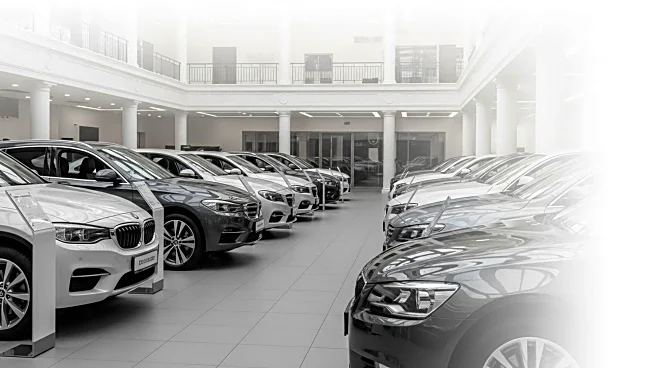What's Happening?
An automotive consultant, Brandon, has reported that car dealerships across the United States are experiencing an overflow of inventory, indicating a potential crash in the auto market. According to Brandon, vehicles are remaining unsold on lots for an average of over 120 days, a situation not seen since before the COVID-19 pandemic. This surplus is attributed to a decrease in consumer purchasing, with manufacturers offering low financing rates to stimulate sales. The consultant's observations are supported by data from S&P Global, which shows a decline in car sales in the first half of 2025 compared to previous years. Additionally, dealership inventories have risen, and certain models are sitting unsold for extended periods, prompting significant discounts to entice buyers.
Why It's Important?
The current state of the automotive market presents a unique opportunity for consumers. With dealerships struggling to move inventory, buyers may find themselves in a favorable position to negotiate better deals. The overflow of stock and reduced sales have led to manufacturers offering incentives such as low financing rates, which could benefit those looking to purchase a vehicle. However, the situation also reflects broader economic challenges, including inflated pandemic-era pricing and negative equity for consumers who financed expensive cars during that time. This market condition could have long-term implications for the automotive industry, affecting production rates and dealership strategies.
What's Next?
As the automotive market continues to experience a slowdown, consumers may leverage the situation to negotiate better prices on vehicles. Dealerships might respond by further reducing prices or offering additional incentives to clear inventory. Manufacturers may adjust production rates to align with current demand, potentially leading to a more balanced market in the future. Industry stakeholders will likely monitor these trends closely to adapt their strategies and mitigate potential losses.
Beyond the Headlines
The overflow of car inventories raises questions about the sustainability of current automotive industry practices. The reliance on aggressive financing and discounts to stimulate sales may not be viable long-term solutions. Additionally, the market's condition could influence consumer behavior, encouraging more cautious spending and consideration of alternative transportation options. The situation also highlights the impact of economic fluctuations on consumer confidence and purchasing power.










